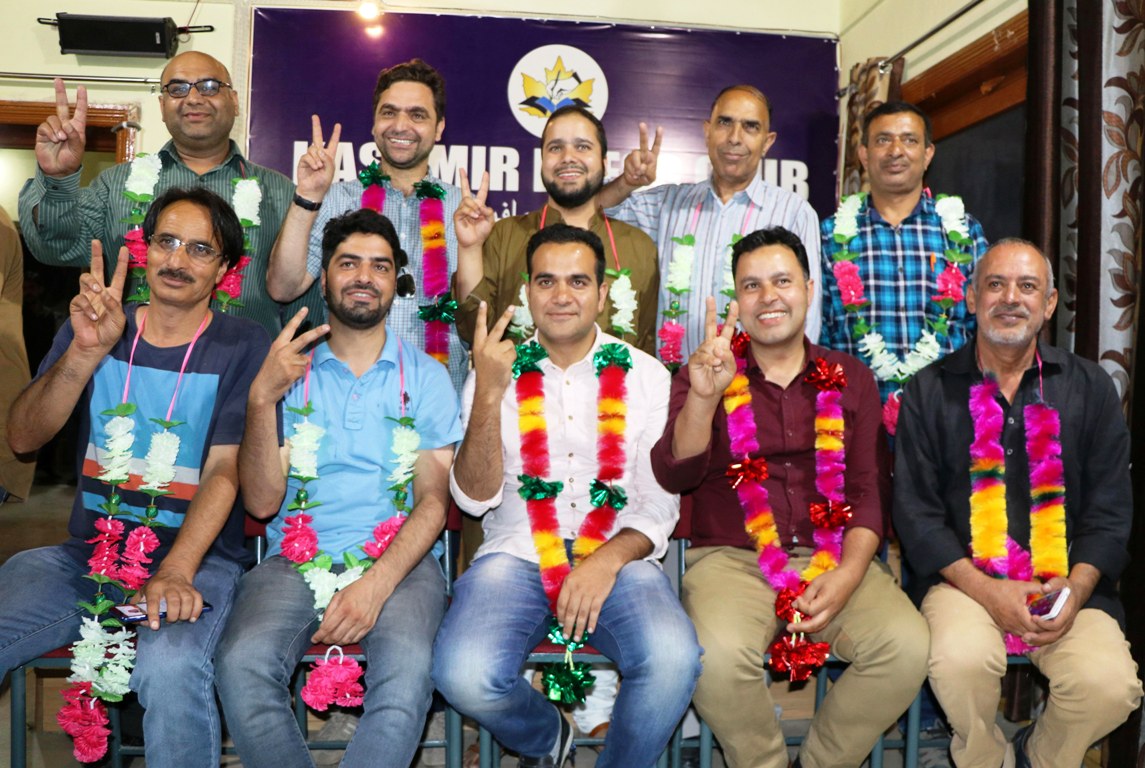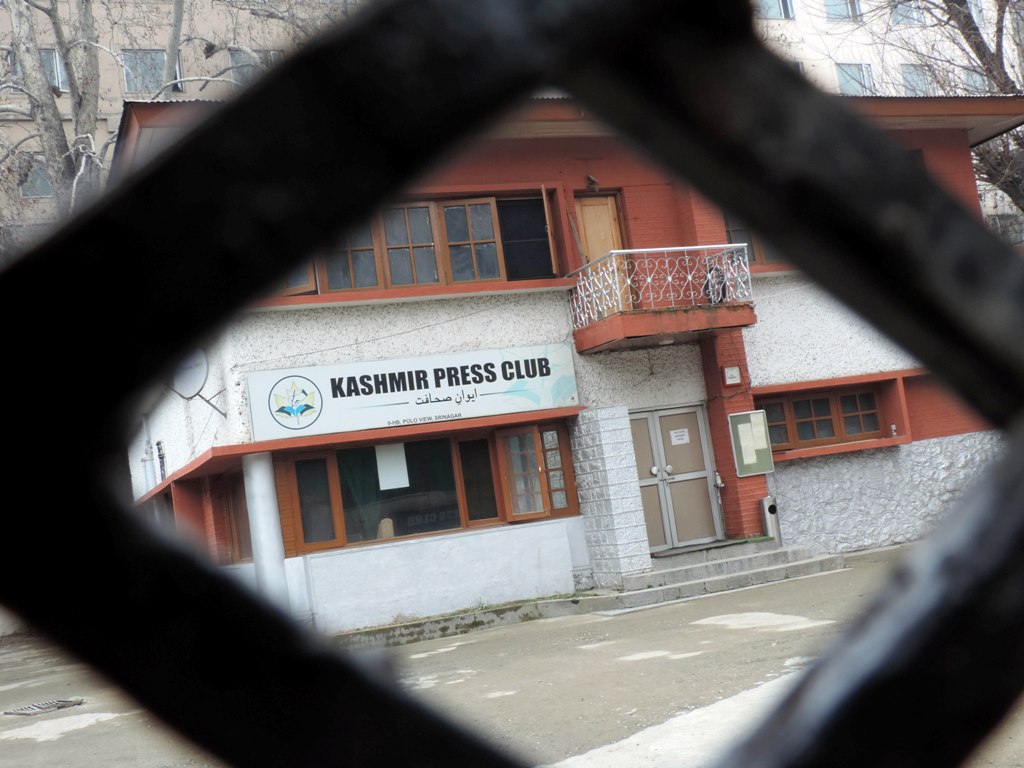Formal closure of the Kashmir Press Club (KPC) following a ‘coup’ and de-recognition is being seriously felt by scribes as the loss of an address and the second home, reports Khalid Bashir Gura

On October 13 2021, when police summoned multimedia journalist Muktar Zahoor for questioning at midnight, his family rushed to Kashmir Press Club (KPC). The next day, according to Zahoor, who was locked up till 11 am, some senior KPC members talked to police on his behalf. He was eventually set free.
For many like Zahoor, KPC was like a second home. For many freelance journalists who have no office space of their own, KPC was the address.
With more than 300 scribes as its members, KPC held its first election in July 2019. Less than 32 months later, it was rendered inaccessible on January 17. After a self-imposed body closed it for a week for alleged Covid19 reasons, the government handed over the building to the Estates Department in the wake of “a threat of breach of peace and safety of bona fide journalists” and declared that the KPC as a registered entity ceases to exist. The closure came four days after a self-appointed body declared the Club takeover on January 15.

Re-Registration, Reversal
On January 14, afternoon the KPC issued a statement announcing that the re-registration process has been completed and the fresh elections will take place on February 15, 2022.
In April 2021, a public notice was issued to all registered societies for re-registration under the Society Registration Act, 1860 before the Registrar of Firms and Societies, Kashmir, Srinagar. The KPC moved the application in May 2021. “Finally on December 29, the letter of granting us re-registration was granted,” Shuja ul Haq, the KPC president said.
However, the same evening the elections were announced, the Registrar of Societies sent a quick communication to the KPC. “The re-registration granted (to the KPC) on December 29, 2021, is hereby kept in abeyance till the receipt of the final report from Additional District Magistrate, Srinagar,” the official communication said. It was conveyed that the Senior Superintendent of Police (SSP), CID, has put on hold the non-involvement and verification of character and antecedent certificate of members of the KPC managing body.
A natural response was that the KPC would call meetings of its various bodies to create a mechanism for smooth functioning and interaction with officials.
The Takeover
On January 15, afternoon as the weekend lockdown was in force, a group of journalists entered the Club and started a meeting. While an unusual deployment of the CRPF was on the main road, the police accompanied them, perhaps for the first time since the Club came into being.
“A day before, cops visited the club to assess if there would be a law and order problem tomorrow. It was this visit that led to the spread of the word that some journalists will seize the control of the club,” said Shahid Tantray, member, working with the Caravan Magazine. “I personally saw police entering the premises. There were CRPF deployments outside and local police inside and outside the club which I have never seen since its inception.”
The journalists were led by Mohammad Saleem Pandit, who is with Times of India, who drove in an official ambassador car as his security details stood guard outside the meeting hall, said another witness.
After less than an hour meeting, the group issued a statement saying the Club being defunct for the last six months has elected a new interim body. It said that various journalist organizations across Kashmir unanimously decided to form an interim body of three members with Pandit as the President, Zulfiqar Majid as General Secretary and Arshad Rasool as the treasurer. He announced the takeover personally. He did face some uncomfortable questions and left quickly. The first decision, announced later, was that the Club is shut for a week because a person was detected positive, an unprecedented decision.
It was later learnt that an application had been moved to Deputy Commissioner, Srinagar, by a few “journalists” – some of whom later said they had no idea that they were applicants, suggesting takeover of the Club under Pandit. It was not immediately known if the DC took any decision on that January 13 letter.
Reactions
It was not an ordinary happening. Almost all journalist bodies termed the “takeover” as “highly illegal and condemnable” and said it was carried out with “open support of local administration”. It said that a large number of police and paramilitary men was deployed before the “takeover”.
“If such incidents are allowed to happen with a Press Club in Kashmir this can be a precedence for future,” the Kashmir journalist bodies said in a joint statement while making the press bodies across the country take note of the happening. The same day, all the journalistic bodies met and announced a panel for holding the next election and re-registration process.
Curtains Down
The Club remained locked from inside on Sunday, January 16. The next morning, January 17, the government took hold of the press club building and handed it back to Estates Department.
It said it is concerned over the emergent situation which has arisen due to the unpleasant turn of events involving two rival warring groups using the banner of the KPC and thus intervention has been necessitated, a statement issued by the government said.
“In view of this aspect of the dispute and in view of the reports in social media and other sources indicating a potential law and order situation including a threat of breach of peace and the safety of bona fide journalists, an intervention has become necessary,” the statement said.
While reiterating its commitment to “a free and fair press”, the government hopes that a duly registered bona fide society of all journalists shall be constituted as soon as possible and the same shall be able to approach the government for reallocation of the premises. The premises were restored to Estates Department. “However, since the original KPC itself has ceased to exist as a registered body, the question of any interim body is rendered infructuous,” the statement said. “In these circumstances, issuing of notices and communication by any group using the rubric of erstwhile KPC is illegal.”
Takeover Denounced
The ‘coup’ and the eventual takeover by the government was widely criticised by media organisations and watchdogs within and outside India. Almost the entire political class reacted to it. Mehbooba Mufti, in whose reign the KPC came into being, called, it a “state-sponsored coup”.
India’s quasi-judicial media watchdog, Press Council of India, termed the cancellation of registration and takeover of its premises by the administration as “illegal”. It wrote to the Lt Governor seeking his “effective intervention” while insisting that his administration violated the “basic constitutional rights” of the journalists by resorting to “deliberate” action.
While the undoing of a Press Club indicated the state of media affairs in Kashmir, it did trigger a chain reaction across the media networks within the country.
A Home Lost
But the condemnations have not been able to restore the “home” that Zahoor and scores of others had located in the KPC.
“It had emerged as a vibrant place where budding reporters would come and seek guidance from seniors,” Shuja ul Haq said. “We would hold workshops on fact-checking, data journalism, teaching local language, creative writing, drama, theatre, book reading.” The Club had a gym and an affordable restaurant. Besides that, it availed many other facilities as the top press club of India’s were affiliated with it. As the Covid-19 pandemic raged, the club helped journalists who lost jobs, he said as it carried the activities for the welfare of fraternity.
In the last two years, the KPC had emerged a representative body that was working as a bridge between the media and the administration. “If any journalist was intimidated, arrested, questioned or a case was lodged, the KPC would take it up with the administration,” Muhammad Raafi, staff-editor at Mountain Ink magazine and a freelance journalist said. “Newcomers would learn from the seniors and avail an address.”
Crediting KPC for shaping his journalist career, freelancer Kaiser Andrabi, said the Club was his office. “Post 2019, the number of freelancers has grown owing to layoffs and voluntary resignations,” Andarbi said, insisting this “structural disempowerment” pushed them to the wall.
Safe For Women
Kashmir media, owing to the situation, has been steady in opening up for females. Now when a good number of women are in media, KPC was offering a safe environment. Marila Latif launched her digital venture, The Himalayan Post from KPC. “It was a single roof where you would meet journalists and share contacts,” Latif said. “It is lost and we are scattered.”
Majid Maqbool said the KPC was a learning institution where visiting journalists would meet their local counterparts. “I gave almost twenty best books from my collection to the KPC library for our younger colleagues,” Maqbool said. “I wonder if I will get them back. They are essentially in government custody now.”

Journalism Will Survive
Veteran Journalist, Yusuf Jameel said Kashmir lacks a Club till 2018. Yet journalism survived. Insisting that the dissolution is a wrong step, Jameel said it could be “part of a wider campaign against journalists”.
There were various efforts of having a Press Club but it never materialised. In the late 1980s, Dr Farooq Abdullah government promised a building but it never handed it over saying he “forgot (brining the) keys”. The same building is home to the PDP office now.
After Dr Abdullah returned to power in 1996, Ajatshatru Singh, then information minister proposed setting up the Club in the building that now is DIPR. The same day the promise was made, Jameel remembers, the then Chief Secretary Ashok Jaitley making a call to him saying: “Nothing doing. We are not going to give you space for the Press Club”. Somehow it materialised in 2018.
Within less than three years, KPC is not around. Riyaz Masroor said that “unfortunate closure” is an attack on democracy. “Majority journalists believe they lost their address and home. It was their post office.”















